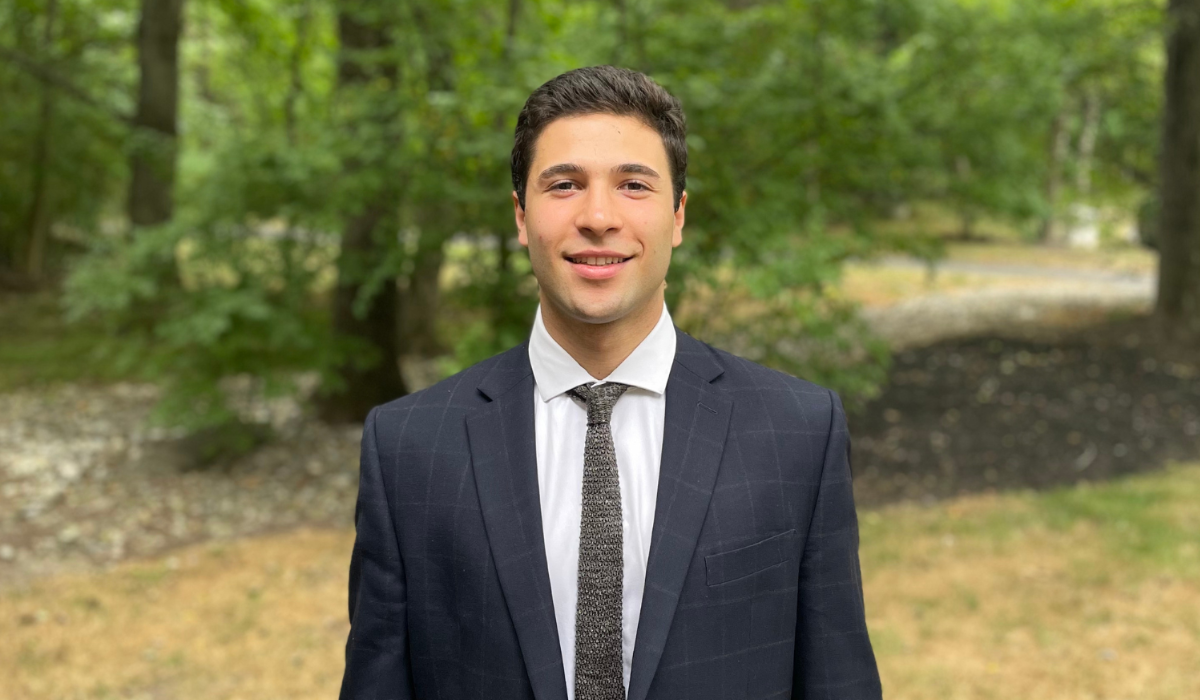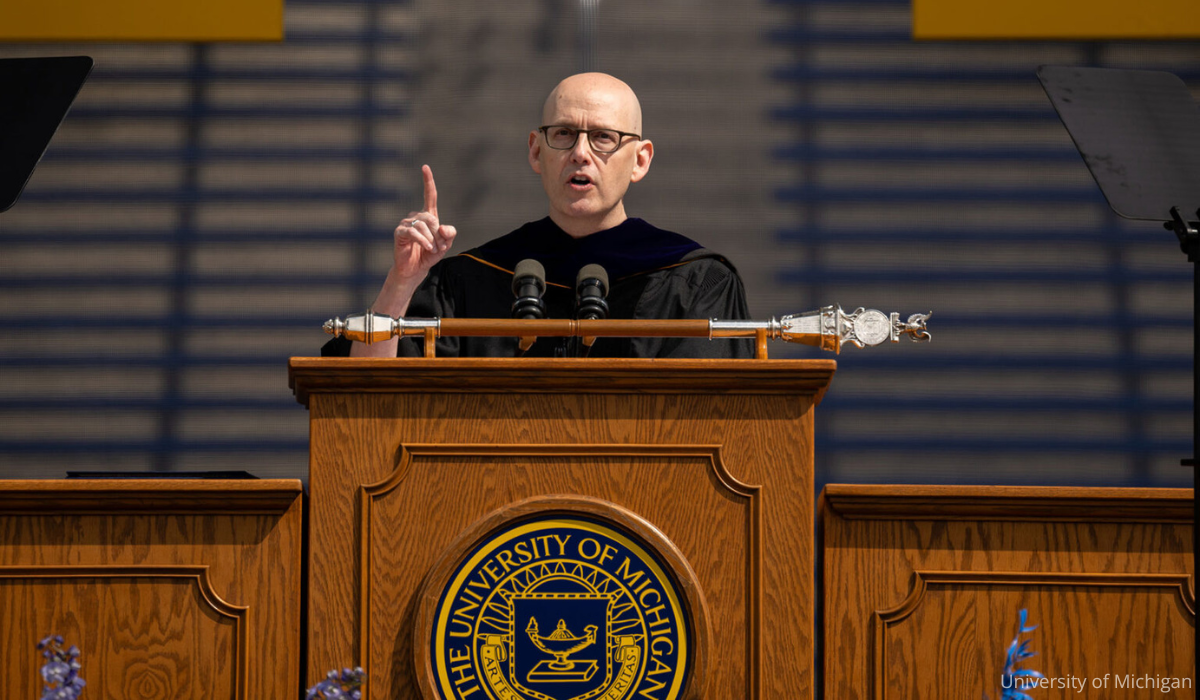“It’s Time for Students to Stop Worrying for Our Lives”: Penn Student Eyal Yakoby’s Call For Real Leadership on the Ivy League Campus
As a senior at the University of Pennsylvania, I am supposed to be studying for finals right now—not dodging smoke bombs and hiding out in my dorm while professors and classmates shout for the genocide of Jews.
And yet, over the course of the last few weeks, I’ve witnessed classmates chanting, “You dirty little Jew, you deserve to die!” and read the statement “Ninety-percent of pigs are gas chambered!” on the pavement as I walked to class.
I am not able to study in the student center because it has been serving as an antisemitism headquarters for the past three weeks.
Recently, there was a bomb threat at Hillel, the campus Jewish center, and a swastika was painted on the facade of the building.
To witness classmates and professors alike chanting proudly for the genocide of Jews has been nothing short of traumatic.
The neighboring university’s president immediately released a statement describing this as a brazen display of antisemitism. He went on to say, “Silence in the face of last night’s demonstration of anti-semitism and hate near our doorstep is not an option for me.”
That doorstep is Penn, and our president did choose silence.
On December 5th, the world got a taste of what I see to be the lack of Penn’s leadership at the Department of Education’s hearing. What we collectively witnessed at that hearing was the rejection of confronting the outright hate speech that has plagued Penn, as well as countless other universities across the country. And no one is currently being held accountable for the anti-semitism that pervades Penn’s campus right now.
What makes a strong leader?
I don’t think anyone truly has an answer to such a nuanced and complicated question, but I do agree with John Kenneth Galbraith, a Canadian-American diplomat who famously said: “All of the great leaders have had one characteristic in common: It was the willingness to confront unequivocally the major anxiety of their people in their time. This, and not much else, is the essence of leadership.”
I agree that only in times of turmoil can a great leader truly emerge. Sadly, the leader of Penn—President Liz Magill—has not emerged as one.
When asked by Congresswoman Stefanik what many would describe as a straightforward question (“Does calling for the genocide of Jews violate Penn’s rules or code of conduct, yes or no?”) Ms. Magill replied, “It is a context-dependent decision, congresswoman.”
Are you kidding me? She could not affirmatively state that calling for the genocide of Jews violates the code of conduct. What conduct is she referring to? Actual genocide?
What an utter failure of leadership. Her response not only lacked clarity but also posed a dangerous notion: That calling for genocide might be permissible under certain circumstances. I believe this ambiguity jeopardizes the safety of all students, not just Jewish ones like me.
While Magill’s response is a miserable and pathetic attempt at trying not to give an unequivocal answer, she is exhibiting the same moral blindness that got her to testify in front of Congress in the first place.
While Magill is on the sidelines putting ambiguous statements out condemning anti-Semitism, the reality is that she is not the perpetrator of such hate—she is simply a bystander who, in her lack of leadership, has allowed such hate to happen.
And in fact, just last night after numerous calls for her resignation following her testimony, President Magill stepped down as president of the University of Pennsylvania.
The removal of Magill was necessary, as there was zero confidence among Jews and non-Jews for her to lead or protect student safety. But what happens next? Addressing the core issue of hatred transcends her lack of actions; the core issue is addressing those who commit such actions.
It was not Magill who posted the logo of the armed wing of Hamas on her Facebook. It was not Magill who liked a message on X stating, “Playing the victim is what Jews are best at.” It was not Magill who supervised the ripping down of posters of kidnapped Israelis. Professors did this. Professors who remain on Penn’s faculty without discipline or repercussions. So while President Magill has stepped down, the hate that exists and is being perpetrated remains.
To protect students and return Penn to a bastion of academic knowledge and not a chilling landscape of hate, an overhaul of the system needs to occur. Resolving the issue fully and ensuring it never happens again necessitates dismantling the network supporting such hate. The growth of anti-semitism demands a comprehensive approach, not just surface-level solutions.
My Hope for the Future of Penn
I love Penn. I’ve wanted to attend this university for as long as I can remember. But the Penn I attend today is unrecognizable from the Penn I used to know.
During COVID-19, strict guidelines governed everything—from class attendance to graduation walks. Yet now, when students and faculty defy policies to intimidate Jewish students, where is the same enforcement? I saw the phrase “Jews are Nazis” etched adjacent to Penn’s Jewish fraternity house. Why hasn’t Penn held the perpetrators of such heinous acts accountable?
Penn’s ambivalence has fueled a crisis that has shattered my academic sanctuary. Nonetheless, I refuse to go back to 1939, when Jews had to hide their religious symbols and who they are due to intimidation and harassment. I used to think this was nonsense and fear-mongering—until I was made aware that Penn recommended that students “not wear clothing or accessories related to Judaism.”
Despite what my university says, I do not feel safe.
Luckily, there are policies in place to protect students from the heinous acts I’ve seen. Unluckily, the university seems to have no interest in upholding those policies.
In the end, I can only hope someone in power finally sees that it shouldn’t be my responsibility to speak in front of Congress about the blatant anti-semitism happening on Penn’s campus right now.
I can only hope that someone will step in so I—and so many of my peers—can simply be students once again.
Eyal Yakoby is a senior at the University of Pennsylvania studying political science and modern Middle East studies. On December 5th, Eyal, along with another University of Pennsylvania student, filed a lawsuit against the University alleging it has not sufficiently responded to antisemitism on campus.




